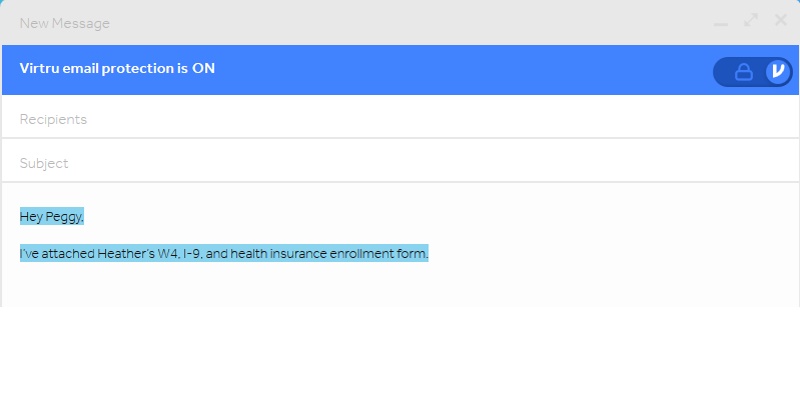Virtru Will Shield Emails From Hackers and the FBI, but Not From Your Boss

John and Will Ackerly each had stints in the government during the surveillance build-up of the past two decades - John as a Bush administration technology adviser and Will as an engineer at the National Security Agency.
Today the two brothers from the District of Columbia play very different roles: helping individuals and corporations evade snooping of all sorts through an encrypted communications app called Virtru.
"Our focus is on the 99.99 percent of folks who know they've got to secure their content, but it's always been too hard and complicated before," said CEO John Ackerly.
For the layperson, it's hard to tell whether Virtru's system is any better than its competition.
But on ease of use, the app unambiguously delivers. I was sending encrypted emails from one account to another within 30 seconds of downloading the company's app for Android.
And when I switched to my horribly slow, virus-ridden laptop to test Virtru's browser plug-in, I found it lightning-fast and glitch-free despite a crummy Internet connection.
But the real fun comes with the extra features in the app. Virtru lets you delete or revoke access to emails you've sent. It has an "expiration" function so you can set emails to erase themselves after a certain amount of time.
Another useful feature forbids the sender from forwarding. Someone could sidestep that restriction by copying and pasting into another browser, but even that could change soon: A company spokesperson said tracking whether email content has been Ctrl-C'd is "an issue and feature we're working on."
Virtru's website advertises "end-to-end encryption," a term usually reserved for communications that can be accessed only by sender and recipient. According to the company, that's the case for the individual users who download the free app.
But if you're signed up through your employer, you should know that an administrator somewhere in your company might be reading your emails. For the businesses and government agencies it sells to, Virtru builds in features that can closely monitor employees' communication.
At $60 (roughly Rs. 4,000) per user, these corporate accounts bring in a lot of money for Virtru. Staffers at HBO use it to send movie scripts and limit whom they get forwarded to, perhaps trying to prevent leaks like the one that brought us last year's first four "Game of Thrones" episodes ahead of time. A contract with state government in Maryland means some 10,000 police officers and law enforcement staffers use the app to encrypt their communications.
Keep in mind that even corporate emails set to "expire" can be retroactively accessed if a corporate customer so chooses. For private businesses, that means a technology administrator could pull up even your private encrypted emails in the event of an audit. For government officials using the app in Maryland, that could mean a Freedom of Information Act request from a journalist, according to Ackerly.
And it's not just big corporations and government agencies passing sensitive data through Virtru's servers. The Pentagon pays Juncture Consulting, a 10-person company based in Woodbridge, Virginia, to evaluate retiring soldiers' health to determine how much disability compensation they will get.
Chief operating officer Michelle de Stefano says the physicians she hires handle that work on government computers. But managing those employees' sensitive information is a different story, she says, so she started paying about $120 a year for a basic version of Virtru's software.
"I don't want to be responsible for screwing up somebody's identity information and having something bad happen to it," said de Stefano. "I don't want to be that weak link."
© 2016 The Washington Post
For the latest tech news and reviews, follow Gadgets 360 on X, Facebook, WhatsApp, Threads and Google News. For the latest videos on gadgets and tech, subscribe to our YouTube channel. If you want to know everything about top influencers, follow our in-house Who'sThat360 on Instagram and YouTube.
Related Stories
- Samsung Galaxy Unpacked 2025
- ChatGPT
- Redmi Note 14 Pro+
- iPhone 16
- Apple Vision Pro
- Oneplus 12
- OnePlus Nord CE 3 Lite 5G
- iPhone 13
- Xiaomi 14 Pro
- Oppo Find N3
- Tecno Spark Go (2023)
- Realme V30
- Best Phones Under 25000
- Samsung Galaxy S24 Series
- Cryptocurrency
- iQoo 12
- Samsung Galaxy S24 Ultra
- Giottus
- Samsung Galaxy Z Flip 5
- Apple 'Scary Fast'
- Housefull 5
- GoPro Hero 12 Black Review
- Invincible Season 2
- JioGlass
- HD Ready TV
- Laptop Under 50000
- Smartwatch Under 10000
- Latest Mobile Phones
- Compare Phones
- Vivo Y19 5G
- iQOO Z10 Turbo Pro
- iQOO Z10 Turbo
- CMF by Nothing Phone 2 Pro
- Motorola Edge 60
- Motorola Edge 60 Pro
- Motorola Razr 60
- Motorola Razr 60 Ultra
- Asus ROG Zephyrus G16 (2025)
- Asus ROG Zephyrus G14 (2025)
- Honor Pad GT
- Vivo Pad SE
- Moto Watch Fit
- Honor Band 10
- Xiaomi X Pro QLED 2025 (43-Inch)
- Xiaomi X Pro QLED 2025 (55-Inch)
- Asus ROG Ally
- Nintendo Switch Lite
- Toshiba 1.8 Ton 5 Star Inverter Split AC (RAS-24TKCV5G-INZ / RAS-24TACV5G-INZ)
- Toshiba 1.5 Ton 5 Star Inverter Split AC (RAS-18PKCV2G-IN / RAS-18PACV2G-IN)

















